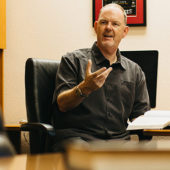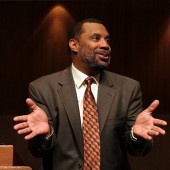Genetic and reproductive technologies are rapidly advancing, often without consideration of their underlying values. Can we continue to make, and remake, ourselves without consequences? What does the Bible have to say about bioethics?
Bioethics expert Dr. Ben Mitchell helps us understand the fertility industry through a biblical lens, and explains how technological advancements in this industry often create issues of moral and ethical concern.
“Basically, the fertility industry is an industry. The fertility specialists, as a group, there are exceptions, but they’re going to offer you the options that they can do. That is, they’re going to offer you the wonderful power of science to do what you want to do. But they don’t answer the question as often what you should do or what you shouldn’t do.”
“Just because we have the ability to do something, doesn’t mean it’s the morally right thing to do.”
Dr. Mitchell says it’s important for us to think through the nature of the human person from a biblical perspective before making any conclusions.
“Who is this unborn human being? Well, it’s a person made in the image of God and whatever we do, we ought not harm this person. We should respect the life of this individual. In some cases, that may mean that we don’t bring those individuals into existence; I don’t mean abortion, I mean that we don’t mix the sperm and the egg unless we’re willing to implant those embryos in a mother’s uterus.”
“Embryos belong in uteruses, so we don’t need to create embryos that we’re not willing to transfer to a mother’s uterus. These embryos are human beings, they’re very young human beings, and every one of us was once an embryo.”
We first need to address the nature of the human person, but Dr. Mitchell says we also have to look at the nature of medicine.
“What is the aim of medicine? Medicine’s aim is not to provide every possible fulfilled desire that we want, medicine historically has been a healing art. We have to ask, is medicine helping to bring healing? Or is medicine being used to help us achieve perfect humanity, or helping us achieve our desire for a child who has symphony skills?”
“The desire to create a child or give birth to a child who’s going to be a symphony performer isn’t a healing desire, it’s a perfecting desire. Those are two different types of desires: one is warranted to heal, to have a perfect child is unwarranted It seems to me.”
By carefully considering the facts from a biblical vantage point, we will be able to discern the moral and ethical guidelines when it comes to genetic and reproductive technologies.
C. Ben Mitchell (PhD, University of Tennessee) is the provost and vice president for academic affairs and holds the Graves Chair of Moral Philosophy at Union University in Jackson, Tennessee. He is author of several books including .
Bioethics and the Bible





















